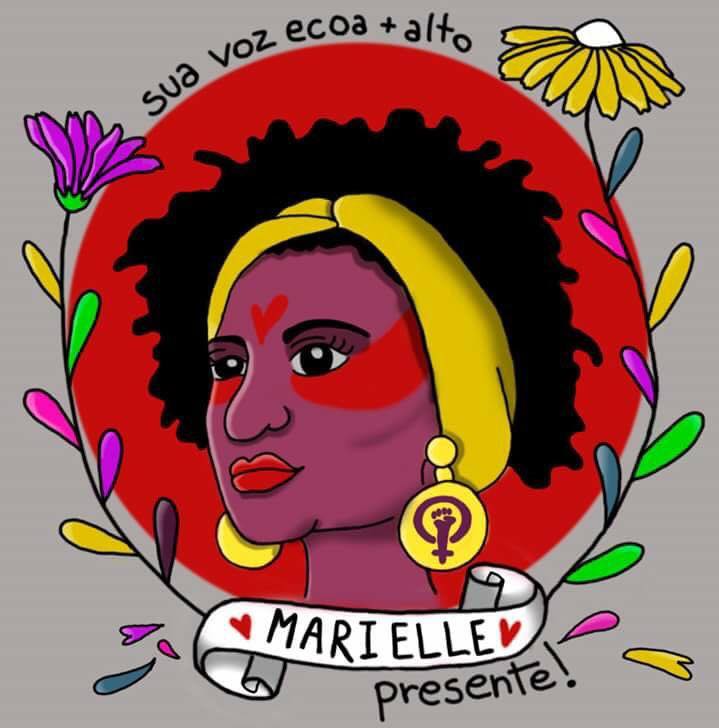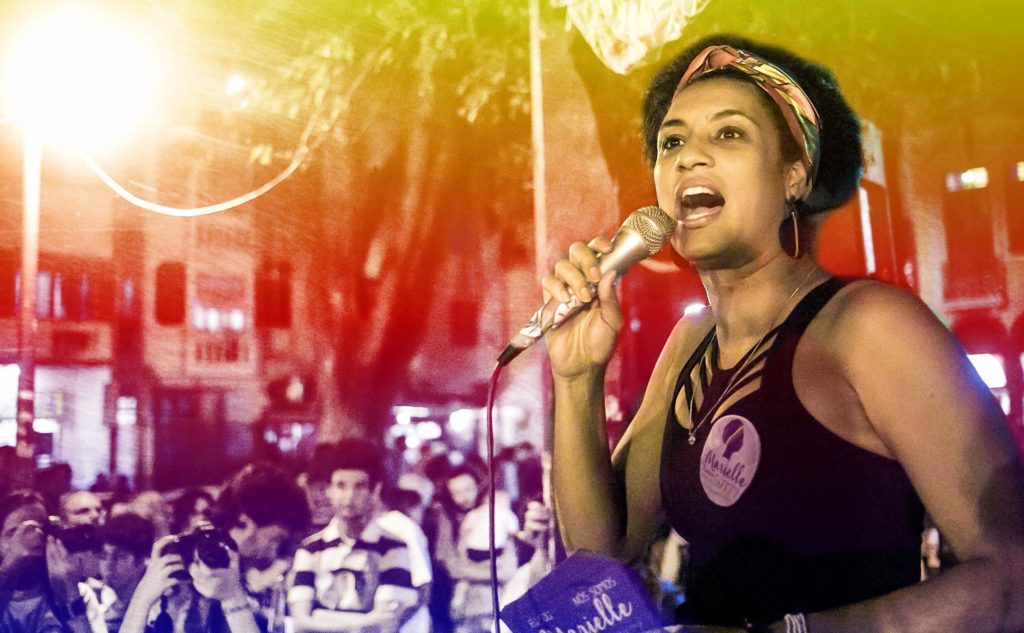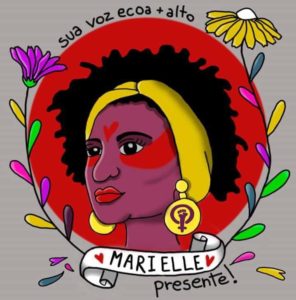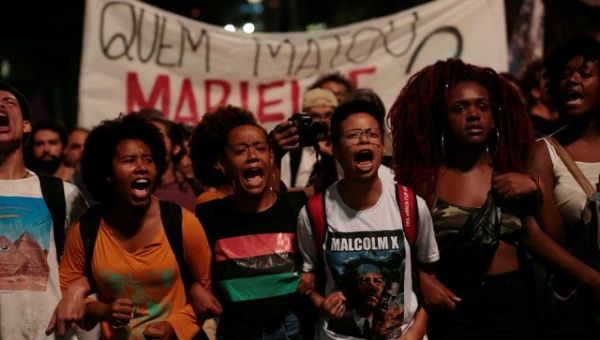WHO KILLED EDUARDO, MATHEUS AND REGINALDO?Brazil’s Marielle Franco Denounced Three Murders in the Days Before Her Assassination. These Are the Stories.
ARIELLE FRANCO’S KILLERS were not out to rid themselves of a 38-year-old member of Rio City Council who dedicated her days to pressing political causes. They wanted to silence an idea.
Franco was killed in a nighttime ambush with no chance to react. It’s the same cowardly way that people are killed in impoverished favelas across Rio de Janeiro and the rest of Brazil — places where the mail isn’t delivered, the electricity is spotty, the water is polluted, and schools close when gunfire begins. In these parts of town, residents’ main point of contact with the government are armored personnel carriers — known as a “Big Skull” — who enter their neighborhood with a license to kill.
In her first campaign for public office in 2016, Franco ran from a scrappy, progressive political party, and still won the fifth-highest vote total out of her colleagues on Rio de Janeiro’s City Council. A black, lesbian single mother, born and raised in a favela, Franco was a rare face of representation in an overwhelming white and male political landscape. And with two degrees from one of Brazil’s most elite universities and over a decade of experience in politics, she was an undeniably powerful charismatic force in the growing movement to confront the epidemic of violence perpetrated or perpetuated by the state. Last year, Rio saw only slightly fewer killings by police than in the entire United States, which is itself a dramatic outlier.
“It was a message,” came the refrain from mourners. But what were Franco’s killers trying to say? And to whom?
Stunned mourners filled the streets of downtown Rio de Janeiro last Thursday to grieve and protest Franco’s death. “It was a message,” the oft-heard refrain came from the crowd. But what were Franco’s killers trying to say? And to whom? The killers seemed to shout in a whisper: “Don’t you dare mess with the systems around you.”
It is too early to know whether Franco’s murderers took her life in retaliation for her activism against police violence. A few scant facts have emerged in the days since her assassination suggesting that perhaps Franco’s murder shares similarities with the killings she regularly denounced. Police investigators traced bullet casings found at the crime scene to a purchase made by the Federal Police. Bullets from the same batch were used in the deadliest massacre in São Paulo’s history in 2015. Two police officers and a municipal guard were convicted of murdering 17 and the attempted murder of seven more. The connection to the police bullets led a top federal criminal prosecutor in Rio to quickly go on the record to say the details of Franco’s murder “denote a certain degree of planning that leads me to consider police officers as suspects in this crime,” but that other hypotheses should also be considered.
Whatever the result of the investigation into Franco’s death and its possible connection to her advocacy, all the killings offer a window into the violence and impunity that reigns on Rio de Janeiro’s streets.
In Rio, around one in six homicides are solved, according to official statistics — though that number hasn’t been updated for more than three years. From 2010 to 2015, police killed 3,441 people, yet charges were only filed in four of those cases — about 0.1% — despite, for instance, Human Rights Watch having independently documented 15 cases over that period which merited investigation.
These statistics are just symptoms of much bigger problems. Approximately 2 million people live in areas controlled by milícias, gangs run by current and former members of the police and firefighter corps. Milícias were explicitly supported by state institutions, which sold them as an answer to combat drug traffickers. Soon, however, the milícias proved themselves to be as violent and oppressive, or worse, while making small fortunes by extorting local businesses, running illegal rackets, and, in some areas, selling drugs. While milícias battle drug gangs for territory head to head, on-duty cops are notorious business partners of traffickers, demanding a fixed monthly cut of the profits in exchange for protection and intelligence. Corrupt cops also sell guns and munitions to the very gangs their colleagues may do battle with the next day. Politicians benefit from the criminality in a variety of ways and have shown themselves to be unwilling or unable to fight against it.
Marielle Franco is gone, but the pressure to respond to these murders – and all crimes against young people in poor neighborhoods – cannot stop. The conventional wisdom that organized crime can’t be confronted without using weapons is wrong. The idea that people in Brazil’s poor suburbs cannot have personal freedoms is as tired as it is wrong. Perhaps a single woman cannot stand down Brazil’s lords of war, but the masses can.
Just days before her execution, Franco denounced the murders of three men. They were all young and from poor neighborhoods, members of the “target demographic” for violent death, the type of killings that fill Brazil’s cemeteries. Two of the victims’ killings took place in a police district infamous for the bloody terror it inflicts on residents; another died at a police checkpoint in a different favela. These are the stories Marielle Franco told.
3-1521266962Illustration: Pedro Franz
Matheus Melo Castro, 23. Killed on March 12
It was a short trip on the route he always took. Matheus Melo Castro, a pastoral assistant, had wrapped up a Monday meeting at the Mission of Faith Evangelical Church in a favela called Manguinhos. He hopped on the motorcycle he had bought with his earnings as a garbage collector to drop off his girlfriend in the Jacarezinho favela. A single avenue separates the two communities. On his way home, around 10 p.m., Melo came across a police checkpoint. Onlookers said the officers were stopping and frisking underage boys. Melo’s family said he was not told to stop his bike. He went through the checkpoint, and just a few yards ahead, two bullets tore through his body, one in the chest and the other in the right arm.
Melo fell to the ground. Police watched from a distance, as if they’d just taken down an animal in a hunt. They offered no first aid. Gravely wounded but still alive, crack users wandering the nearby streets came to his aid. Unsure what to do, they decided to put him in a wheelbarrow and ran across a heavily trafficked avenue to get to an urgent care clinic.
Police offered no first aid. Gravely wounded but still alive, crack users wandering the nearby streets came to his aid.
Drivers passing by witnessed the scene and word about the incident spread. More than 100 friends and relatives quickly assembled to keep vigil outside the clinic. Many of those present were with Melo singing and praying in church just a short while earlier. He had led the service they called “youth refuge” that night.
The medical attention was not enough, and Melo succumbed to his wounds.
“It was cruel. He went by and they shot him up,” one of Melo’s aunts told The Intercept Brasil.
A cousin added, “Worst of all, they didn’t offer first aid. It was the crack addicts that carried him to the clinic. If he had been a trafficker, the police would have captured him and guarded him in a hospital. But since he was just a random guy, they shot him and left him, like he was nobody.”
His family members asked to not be named, fearing reprisals for speaking publicly about the crime.
In cases such as Melo’s death, a stilted, perfunctory apology from the police is the norm. Usually, they put out a short press release that says nothing, because these deaths are just collateral damage — unlucky victims caught in the eternal crossfire between the Good Guys and the Bandits. Yet local residents in Manguinhos said there had been no confrontations going on at the time Melo — who was well-known in the neighborhood and said to have no criminal connections — was killed. Some hours later, however, people began to hear gunshots.
Melo’s family believes the shootout after the fact was an attempt to portray Melo as another tragic victim of a “stray bullet.” The family saw it as smoke and mirrors. The local police united responsible for “pacifying” – a euphemism used by the Rio government to designate a crumbling, decade-old community policing initiative – the favela said that its base in the neighborhood was “attacked by criminals” and they were therefore obliged to return fire. Additionally, a bus had been set on fire in the early-morning hours on a main access road into the favela. All of this took place within walking distance from a sprawling “Police City” compound, which sits wedged between the favelas of Manguinhos and Jacarezinho. The bus arson, just like Melo’s death, is under “confidential investigation,” like so many other cases that collect dust in Rio’s police stations.
Melo’s family feels threatened and is considering fleeing, following advice proffered by some some neighbors. But the family is also considering fighting back. The family is looking for his killers despite their fear, and Melo may well have his day in court. His family intends to sue the state government and has already begun a parallel investigation to find out who pulled the trigger. Their lawyers are looking for images from the city’s traffic surveillance cameras that may have captured his last minutes of life. Security cameras from a nearby animal shelter may also offer crucial footage.
The press office of Rio’s Civil Police, responding to queries about Melo’s death, said in an email that the probe is “ongoing and, at the moment, there are no updates to report about this case.”
The police high command from the unit responsible for “pacifying” the favela said it has opened an inquiry to verify if one of its officers was involved in the shooting. By phone, a representative from the unit told The Intercept Brasil that an internal probe had been opened the day after the crime. They were not able to confirm whether a police vehicle was at the location where Melo was killed. “Even if there were one, it was not necessarily from the pacifying police unit. It could have been from the local Military Police battalion or the Civil Police,” the source said. The police probe underway is an “inquiry,” not a full-blown “investigation,” which means that it cannot produce formal accusations.
Into this fog of uncertainty waded Marielle Franco — as she so often did. “Yet another young man’s murder that may have been at the hands of the police,” Franco tweeted last Tuesday. “Matheus Melo was leaving church. How many more need to die for this war to end?”
The next day, amid hymns and cries for justice, Melo was buried in a Rio de Janeiro cemetery. Just hours later, Franco was executed.
2-1521267456Illustration: Pedro Franz
Eduardo Ferreira, 39, and Reginaldo Santos Batista, age unknown. Killed March 5
Locals heard gunshots shortly before sunrise. They thought it odd at such early hour. It didn’t look like there was any shootout going on with drug traffickers – their usual points of sale weren’t even open yet. When the shots died down, a small group of neighbors went to investigate the scene. They found two bodies in a sparsely forested area near the Acari River in the northern part of Rio de Janeiro.
The first was lying facedown, wearing board shorts and a T-shirt, his eyes shut. The neighbors decided to pull him up by his legs and get him off the slope in order to identify the body. In times like these, no one waits for a forensic crew to arrive – that can take hours. So bystanders try to divine for themselves if the victim was a friend or relative. Later, the locals would discover the body belonged to Eduardo Ferreira, 39.
“Here, we learn how to hoist a body when we’re just kids.”
The other body, a few yards ahead of him on a steeper incline, belonged to Reginaldo Santos Batista, whose age was unknown. More effort was required to lift Batista off the hillside. “Here, we learn how to hoist a body when we’re just kids,” said one of the locals. “Do you know how to do that? I think not, right?”
It took all day for the homicide unit of the police to arrive. At around 7 p.m., they filled out a body tag: “Black man, muscular, strong features, shaved head.”
Ferreira lived in Acari since he was a child. He left behind two children and a girlfriend. His mother, siblings, and cousins are all evangelical Christians who also live in the neighborhood. Ferreira was self-employed and “always chatting” with locals in the area, according to his friends. “He was a solitary guy. Somewhat shy,” said a local resident. “I remember him telling me to be careful in this area. He was concerned about his neighbors.”
Little is known about Batista. No one came forward to claim his body.
The circumstances of the deaths remain shrouded in mystery. Eyewitnesses said a group of police officers were hiding in the forest just outside the Acari favela and left the bodies there before taking off. The 41st police battalion, infamous for being the most lethal unit in Rio, posts near daily updates about its actions usually appear, but there are no entries for March 5. The Twitter account of the Rio state police also has no mentions of an incident in Acari.
When questioned, the police said they were unaware of any operation underway in the area at that time. A few hours later, they sent out a press release saying that police from the 41st battalion were patrolling the area to “repress drug sales, car robberies, and arrest criminals.” The release also said that police had arrested a suspected drug dealer, who goes by “Timbau,” that was carrying a walkie-talkie.
After the Monday killings, there were shootouts every day for a week. The following Saturday, a neighborhood woman was going to pick up donations at the community residents’ association when she heard shots. She looked around to see if there were any drug dealers engaged in a shootout or if the points of sale were open, but it was early and everything was closed. Police were “shooting at random from their vehicle,” she said. “I looked all around and I could not tell why they were shooting. There was nothing. Just residents out on the streets.” She took shelter at a neighbor’s. It was 8 a.m.
“Around 1 p.m., I went back to the same place and there were even more police, and they kept shooting. That’s when two armored police vehicles entered the favela,” she said.
Other residents sent voice messages around to alert the neighborhood. “My God, so many gunshots here,” one said. Another, on the verge of tears, related: “Guys, I am so scared. Really scared. They’re right in front of my house.” Another neighbor responded: “These guys are harassing residents. Shooting up other people’s houses. This isn’t right. On a Saturday?”
As the hail of gunshots from the police continued to ring out through Acari, Marielle Franco answered the call. She denounced the police operation. On her Facebook page, she wrote: “We need to raise our voices so everyone knows what’s happening in Acari right now. Rio’s 41st Military Police Battalion is terrorizing and abusing residents of Acari. This week, two young men were killed and thrown into a gulley. Today, the police walked the streets threatening residents. It has always happened and with the military intervention it has gotten even worse.”
Adapted to English by Taylor Barnes and Andrew Fishman
https://theintercept.com/2018/03/21/mar ... ce-police/ 





